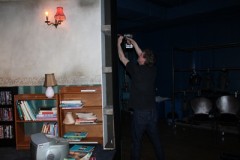Billed as a tale of brotherhood, addiction and breaking the laws of physics, we hope you enjoy these rough and ready looks into the production process behind Brilliant Adventures.
First up, we catch up with the cast and get their thoughts on stepping inside the world of the play, followed by a conversation with writer Alistair McDowall.
We’ll also be chatting to Director Caroline Steinbeis as well as asking one of the tech crew on how you go about breaking the laws of physics on stage…
Brilliant Adventures by Alistair McDowall premieres at The Royal Exchange Theatre, 8 – 25 May 2013, before transferring to Live Theatre, Newcastle, 29 May – 15 June 2013.
Being the writer in the rehearsal room… some words from Alistair McDowall…
We’ve just come to the end of the last full week of rehearsals, heading into the tech week where all the lights and sound and fancy bits are put on top. This means I’m now a bit of a spare part – my involvement with rehearsals has come to an end pretty much, and now I’m just waiting around for the show to open and all of the praise/hostility to come flooding over me like a nice warm bath of soothing cream/acid.
It’s been a fantastic process, I hope everyone else involved feels the same.
Here are my thoughts for anyone new to the process of being a writer in the rehearsal room:
 1. It’s someone else’s production of your play.
1. It’s someone else’s production of your play.
You have the right to explain how you feel the play should work and why, and in this country, the writer is usually considered primary artist, so you have a lot of sway, but ultimately there will be things that change/turn out different from how you expected. This should be a magical and invigorating process, which will throw up all kinds of brilliant ideas you would never have even thought of. Embrace that.
Your play is a blueprint for performance, not a list of orders.
2. Biscuits.
Who doesn’t like biscuits? Why not do as I do, and occasionally take some special biscuits into rehearsal? Don’t make a big deal out of it (I do), and you’ll raise spirits and be king for a day (or at least about twenty minutes).
 3. Work out how you and your director work as a unit.
3. Work out how you and your director work as a unit.
I was very lucky in that Caroline and I had already worked together a bit, so we understand each other to a degree. Try and really work out how your director’s working, and don’t tread on toes. Suss out the best way to pitch your hat into the ring without just bulldozing in every time your director is giving notes to the actors. You’re a team, and teams need to discover the best ways to work together.
4. “That’s a really interesting question”
Use this solid-gold response whenever you’re asked a question about the play you have no idea how to answer. It buys you valuable time and makes you seem like a really interesting person.
 5. Don’t foist your judgements of your characters onto the actors.
5. Don’t foist your judgements of your characters onto the actors.
You’ll have spent so long with these characters that you’ll feel the absolute authority on them. There was two and a half years in between writing the play and rehearsing it – I know these lads inside and out. They’re not just characters to me after that amount of time, they’re friends.
But it’s not a good idea to start telling the actors your version of their back stories, or saying things like “Well he’s basically an idiot” or “He’s the baddie”. Your actors need to discover the characters for themselves, and bring their own angle to the role. What’s on the page should be enough for them to do that, give them space. If they ask questions, answer them as best as you can, but don’t tell them how to do their job.
Exploration, experimentation, and eventual discovery breeds better performances.
 6. Be a collaborator, not a dictator.
6. Be a collaborator, not a dictator.
Nuff said.
Ultimately your job is to be there, to answer questions as well as you can, and occasionally point out something you feel has been missed or misunderstood. If you’ve got a good team, then everyone’s there to realise as best as they can what’s on the page, so appreciate that you’re all in the same boat – you all want to tell the clearest possible story to the audience.
Theatre is a collaborative art – your play exists as an agreement between actor and audience, so you have to make an agreement too, to be a fellow collaborator with your director and actors, and hope that together you can create something that’s direct, engaging, and emotionally honest.
Conversation with director Caroline Steinbeis and writer Alistair McDowall…
We managed to catch a few brief words with director Caroline Steinbeis and writer Alistair McDowall about working on Brilliant Adventures and bringing a slice of the North East to a studio stage in Manchester…

